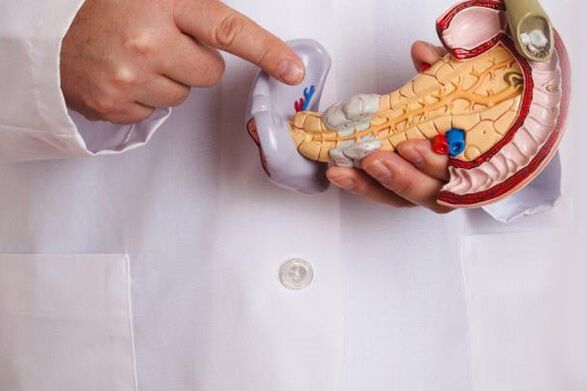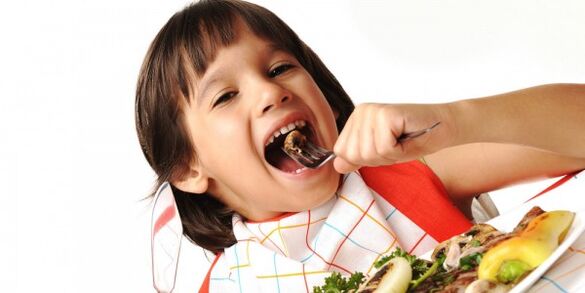Diet for pancreatitis is a big part of effective treatment, so adhering to dietary restrictions makes it possible to live a happy life and reduce the risk of relapse.
Pancreatitis is an inflammation of the pancreatic tissue that results in decreased secretion of digestive enzymes, severe pain, changes in bowel movements and vomiting. This leads to a pathological metabolic disease and can cause the development of diabetes. The main factors in the onset of pancreatitis are: overeating, abuse of fatty foods and alcohol.
It is necessary to follow a diet for pancreatitis for a long time. Acute inflammation requires that the diet be limited to 6-9 months, but in chronic pancreatitis the diet is followed for several years or for life.
Power features

The methods of prescribing a diet for pancreatitis depend on whether the inflammation is acute or chronic. Doctors note the positive effects of diet on pancreatitis. It allows you to quickly overcome acute inflammation, avoid complications and prolong the break in a long process.
Dietary properties:
- Within 2-3 days of an acute pancreatic attack, you must completely refuse food. Thus is rest for the pancreas. Treatment fasting involves the use of liquids in the form of carbonated alkaline mineral water, weak brewed tea or rose knife infusion, one glass 5-6 times a day.
- On the fourth day after the start of treatment fasting, the introduction of solid foods into the diet gradually begins. As a rule, these are low-calorie, salt-free meals that gradually increase the secretion of gastric juice.
- With pancreatitis, it is important how you prepare food. Steam cooking is recommended as food prepared in this way contains all the necessary substances and does not harm the digestive tract.
- Food should not be chilled or hot, the optimum temperature is close to body temperature. In this case, the food should be shredded or semi-liquid.
- Diet for pancreatitis limits the consumption of a balanced diet. They eat small portions at least five times a day.
The diet excludes foods:

- fat;
- fried;
- hot sauces and spices;
- sour juice;
- canned food, pickles;
- smoked meat;
- sweets;
- cocoa, chocolate;
- alcohol.
The energy value of such food should be at the level of 2500 kcal.
The disadvantage of such a diet is the acute shortage of raw plant foods. Some things need to be supplemented by taking complex vitamins and supplements.
Diet for acute pancreatitis
Diet in the treatment of pancreatitis is an integral part of treatment. During exacerbation, the trauma is accompanied by severe abdominal pain and loss of appetite, as the first days of fasting do not cause the patient any pain.
Furthermore, a low calorie diet is gradually being incorporated into the diet. It can be dried uncooked bread, berry fruit drinks and jellies, viscous decoctions of oatmeal and rice, liquid mashed potatoes without oil. At this time it is recommended to exclude products that promote gas formation.
On day 6-7, protein dishes are gradually introduced: steamed meat, mashed potatoes or vegetable pudding, steamed protein egg cake.
It should be noted that the diet requires compliance with dietary restrictions in the long run. For 6-9 months, you need to follow its rules exactly and monitor your diet daily.
The course of the disease can have certain characteristics, therefore, a gastroenterologist and nutritionist are involved in the appointment of a diet. Specialists in this format determine what can be eaten on the pancreatitis diet for each particular patient, taking into account complications.
After the acute period of the disease has diminished, you can significantly increase the menu with simple and healthy products. It should be noted that the number of meals should be at least four, but the volume of fluid drunk is about 1, 5 liters per day.
Example menu:
- Breakfast: porridge (rice) boiled in water; Apple; weak brewed green tea with one tablespoon of honey.
- Second breakfast: steamed chicken breast; carrot puree; decoction of roseberries.
- Lunch: vegetable broth with beef or fish; mashed potatoes; white bread loaf; baked apples without the peel.
- Afternoon snack: low-fat cottage cheese; green tea with a spoonful of honey.
- Dinner>: steamed protein egg cake from three chicken eggs; mashed potatoes from a vegetable diet; white bread skewers.
- Before going to bed: condensed milk.
With diet, the symptoms and treatment of pancreatitis are significantly alleviated. Such nutrition protects the pancreas and gradually normalizes its work. The patient's well-being depends on how closely he or she follows the diet. Any disruption to the diet is immediately reflected in the digestive system.
Diet for chronic pancreatitis
Chronic pancreatitis usually develops on the background of an acute condition, but it can also appear as a major disease in cases where it is a complication of other diseases.
Diet and treatment of pancreatitis are two inseparable concepts. Even during the break, follow dietary guidelines.
Dietary rules for chronic pancreatitis:
- The caloric content of food during this period should be consistent with daily exercise.
- Much attention is paid to the protein content of food. Turkey, chicken, rabbit, beef, lean pork and fish are allowed.
- Lamb, fatty pork, goose, duck and wild game may not be included in the diet.
- Heat treatment of food does not allow frying, baking in the oven, stewing. Food must be cooked in a double boiler or boiled.
- Cheese, which was previously banned in the deterioration stage, is now allowed in small quantities, but it is advisable to replace milk with fermented milk products.
- The diet should include vegetable proteins, which are represented by the cereals and bread of yesterday, but it is necessary to take into account that legumes should be completely excluded during the diet with pancreatitis.
- The total amount of carbohydrates should not exceed 350 g per day. They are found in pasta, breakfast cereals, honey, preservatives and syrups.
Estimated diet for chronic pancreatitis:
- Breakfast: boiled rabbit meat; rice pudding.
- Late breakfast: low-fat cottage cheese; apples baked without honey.
- Lunch: buckwheat soup; boiled or steamed fish with vegetables; dried fruit compote.
- Afternoon snack: steamed chops with vegetable sauce.
- Dinner: veal, unsweetened shirt pudding; weak tea.
- Before going to bed: Kefir.
Meals are broken down and in small portions. Food should be served hot about three hours apart.
Salt and spices cause increased secretion of enzymes in the gastrointestinal tract and therefore their levels should be kept to a minimum. In addition, sour, smoked foods, pastries and sour cream, as well as chocolate, have similar effects. Sugar-rich foods can cause complications such as diabetes, so their content in the diet is reduced by 90%.














































































